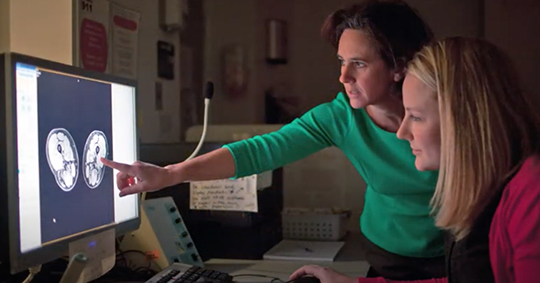
Are you interested in contributing to clinical research to understand how muscle changes over time in Duchenne, Becker, and manifesting carriers?
University of Florida’s ImagingNMD group has several studies currently recruiting participants to better understand changes in muscle on magnetic resonance imaging (MRI), and how it correlates with a variety of biomarkers including blood, urine, pulmonary function testing, strength, and function.
Researchers at the University of Florida are currently conducting a series of natural history studies across different populations to answer a number of research questions for people living with Duchenne, Becker, and women who are manifesting carriers of Duchenne.
Each of these studies has one theme in common: to better understand their progression over time, with the ultimate goal of speeding the development of therapies or drugs that can help slow disease progression.
With this in mind, there are a number of ways you can participate, which are described in the videos below.
Carriers
Dr. Alison Barnard, one of the ImagingNMD researchers, is currently conducting studies to look at manifesting carriers of Duchenne. She has learned that these girls and women can manifest symptoms, including muscle fatigue and pain, with a full spectrum of muscle changes that can be seen on MRI. PPMD is proud to support Dr. Barnard to cover travel costs for individuals participating in her pilot study of carriers.
Breathing Muscles
Dr. Barnard is also conducting a study evaluating breathing muscles in people with Duchenne or Becker, and comparing findings against pulmonary function tests (PFTs) to understand how breathing muscles are impacted over time.
Becker Muscular Dystrophy
Drs. Krista Vandenborne and Claudia Senesac are working on a study looking closely at Becker muscular dystrophy, which includes evaluation by whole body MRI, including the legs, arms, and breathing muscles, along with assessment of strength, range of motion, time functional tests and PFTs. In addition Dr. Vandenborne and Dr. Senesac are collecting blood, urine, and muscle tissue by needle biopsy to better understand biomarkers in Becker.
Response to Exercise in Duchenne and Becker
Yet another study for both people with Duchenne or Becker is enabling researchers to evaluate how people with these diagnoses respond to certain types of exercises, including cycling and isometric exercise, which early studies have shown to increase strength.
Bone Health
The team at UF is also using MRI to measure bone health, as they have learned that MRI can reveal changes in bone strength and density. Through this study, they hope that these measures will help determine which treatments can be most helpful in strengthening bone and preventing fractures in people with muscular dystrophy.
Energy production and oxygen delivery
Finally, Dr. Sean Forbes and his team are using a type of MRI, called phosphorus magnetic spectroscopy, to study energy production and oxygen delivery to muscle, as lack of these components in Duchenne may contribute to decreased blood flow and increased fatigue. In this study, they will evaluate oxygen delivery to muscle after muscle contractions to understand changes over time.
How to Get Involved
The ImagingNMD group at UF is busy with a number of studies aiming to better understand Duchenne, Becker, and manifesting carriers, each with the ultimate goal of driving the development of transformational therapies forward. If you or a loved one with Duchenne or Becker are interested in participating, contact Dr. Claudia Senesac by email at csenesac@phhp.ufl.edu or by phone at 352-273-6453. If you are unsure if you qualify for any of these studies, you can still reach out to learn more about current and upcoming studies, and where you may be able to participate.



 by: Parent Project Muscular Dystrophy
by: Parent Project Muscular Dystrophy

